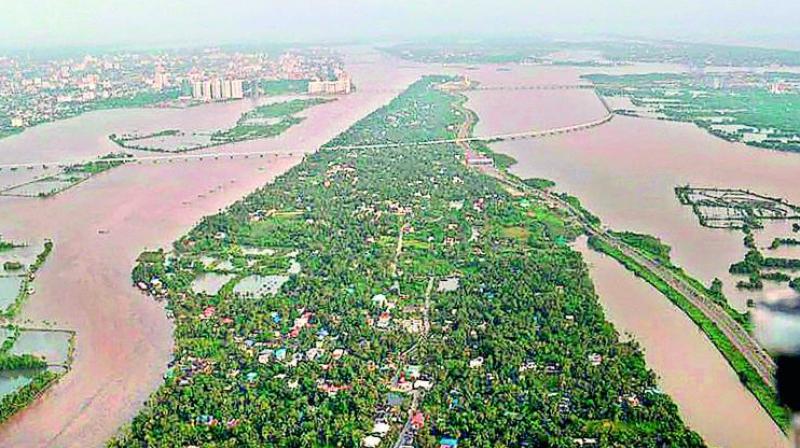Kerala's foreign aid conundrum: A way out

Indian government, through emails, has instructed all its missions abroad to decline offers of aid from foreign governments for the state of Kerala. Sources say that India, for now, has decided to stick to its 2004 policy, in the aftermath of the devastating Tsunami -- won't accept aid unless India cannot handle the crisis. The 2004 tsunami, which affected the coast of Tamil Nadu as well as Andaman and Nicobar Islands, killed more than 12,000 people and displaced 6 lakh. Until then, India had accepted aid from foreign governments. The government had accepted aid for the Uttarkashi earthquake (1991), Latur earthquake (1993), Gujarat earthquake (2001), Bengal cyclone (2002) and Bihar floods (July 2004). In the past 14 years, after tsunami, India has refused aid from Russia, US and Japan for Uttarakhand floods in 2013, and for the Kashmir earthquake in 2005 and floods in Kashmir in 2014.
The government sources note that there are two reasons for such a policy: Firstly, the governments since then have felt that India has the capacity to handle disasters like these. And secondly, accepting from any one government opens the floodgates for others as well, and it would be diplomatically difficult to refuse from some while accepting from others. It also signals India’s economic clout as it has become an aid donor.
The toll this time of the latest fortnight long deluge in Kerala has reached 373, more than 1.2 million people are in relief camps and losses are pegged at Rs 20,000 crore ($2.86 billion), which is 16 percent of the state's 2018-19 expenditure. Most foreign media pegs the losses at $2 billion. First time in its history, Kerala had to open up all its dams. The Modi government has even declared it as the ‘calamity of severe nature’.
In response to Kerala's request for Rs 2,000 crore ($286 million) for the rehabilitation of those affected by recent floods, the Centre has released Rs 600 crore, 30 percent of what the state sought. That's less than the cost of one Rafale fighter jet (Rs 670 crore), 36 of which India hopes to buy from France.
Many foreign governments offered aid, assistance and technical support to help the state of Kerala deal with the crisis. One of the biggest pledges came from UAE, which has a huge population of people from Kerala. UAE has pledged Rs 700 crores towards relief and rehabilitation efforts. Prime Minister of UAE and the ruler of Dubai, Sheikh Mohammed Al Maktoum, noted that the people of Kerala have always been and are still part of the success story in the UAE and hence UAE has a special responsibility to help and support those affected. Around three million Indians live and work in the UAE out of which 80 per cent are from Kerala, according to official figure. Qatar made an offer of Rs.36 crores aid, and Maldives close to a crore.
While the government, for now, is not looking at contributions from foreign governments, private efforts towards relief and rehabilitation will continue. Technically the government cannot stop foreign NGOs and aid organisations with Foreign Contribution (Regulation) Act (FCRA) clearances from contributing to the relief efforts in the state of Kerala that has been devastated with massive floods.
Government spokesman, however, has noted that contributions to the Prime Minister's Relief Fund and the Chief Minister's Relief Fund from NRIs (Non Resident Indians, PIOs (Persons of Indian Origin) and international entities such as foundations will be welcomed. Sources said funds coming from the UAE through foundations or international entities will be acceptable.
For a historical context, during the 2004 tsunami, the then Prime Minister Manmohan Singh had said that India can cope with the situation and will take aid only if needed. The UPA-II government too reiterated the New Delhi's position after the 2013 cloudburst in Uttarakhand in which over 5,700 people died. The sources referred to the government's statement then which said that "as a general policy in case of rescue and relief operations we have followed the practice that we have adequate ability to respond to emergency requirements". However, Manmohan government was open to aid and assistance from foreign governments going beyond relief, in the other phases like rehabilitation, reconstruction, and so on.
Interestingly, backing the Kerala government over foreign aid for Kerala flood relief, BJP minister KJ Alphons from Kerala requested the government to make a "one-time exception", on the ground that Kerala has contributed huge amounts of foreign exchange through remittance in the last 50 years. In fact, in the last year itself, it had brought in Rs 75,000 crore. Also, Kerala is the biggest tourist destination in the country and contributes hugely to the economy. Two former distinguished foreign secretaries, Shiv Shanker Menon and Nirupama Rao, also seconded Kerala CM and the central minister Alphons noting that UAE is a different case, a sensitive one, and home to the largest number of Malayalee NRIs, and hence the aid should be accepted. In the past, India said no to relief but accepted support for rehab. Also, one must distinguish between normal aid and help in a disaster. Later is more humanitarian.
According to the National Disaster Management Plan of 2016, commissioned by the Modi government, if the national government of another country offers assistance as a goodwill gesture to disaster victims, without India asking for it, the central government may accept it, a sentiment also echoed by the Kerala Finance Minister Thomas Isaac. According to the 2016 Plan, the Home Ministry is required to coordinate with the External Affairs Ministry, which is primarily responsible for reviewing offers of assistance and channelising the same.
It must be noted here that during the earthquakes in Latur and Bhuj, India got a lot of material from the Gulf with prior consultation with the government. There has been a Global Convention in Bhuj to raise funds from all sources, including governments abroad, for rehab and reconstruction. One opinion today is that India can invest the foreign assistance directly in creating long term assets in Kerala, rather than negating specially the Gulf aid as Malayalees have a special position in the Gulf nations.
Moving ahead, while foreign aid for relief does not bode well for the current economic clout of India and determination of its government and people to handle our crises ourselves, foreign assistance in long term reconstruction and infrastructure development, from nations who do not put any conditions on it and come forward on their own, can surely be welcome. And in case of Kerala, UAE or Gulf support is a unique case in the light of yeomen service of the Malayalee NRIs in those countries.

